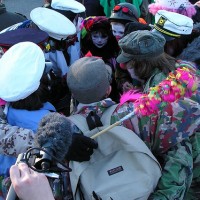In my last post I reflected on the 2014 Americans for the Arts Conference in Nashville. I concluded by mentioning an important session on diversity and promised a follow-up. There is much discussion (lip service and otherwise) of and occasional work toward diversity and inclusion in the arts industry. One difficulty is that much of the support infrastructure in the arts is connected via metaphorical superglue to the white monied establishment. … [Read more...]
AftA Thoughts (2014)
Americans for the Arts held its annual conference in Nashville last month. As always, it was a chance to catch up with long-time colleagues, make new friends, and delve into the issues facing what I call the "arts establishment." I had the pleasure of helping facilitate a gathering of researchers in the field in a discussion of latest trends, needs, and issues. The bottom line was that as young (relatively speaking) as the nonprofit arts industry … [Read more...]
Frames of Reference
"They're an hour behind." Recently, landing in Des Moines on a flight from Charlotte, I overheard a fellow passenger say this to their seatmate. I often hear people describe time zone differences this way, so I might have ignored it; but on this occasion, the tone of voice implied something about the speaker's attitude toward our destination. It sounded a tad condescending, as if the clocks might not be the only thing that was "behind" in this … [Read more...]
Develop Allies
In Engagement Working Group, I discussed an early step in the process of bolstering an organization's commitment to engagement. Once members of this core group–those who already have an understanding of and firm commitment to this work–have discovered each other and begun talking and planning, it is time to expand the base. Developing allies means turning the non-enthusiastic into supporters or at least convincing them not to be … [Read more...]
Mental Logjam
During my participation in Utah Arts and Museum's Mountain West Arts Conference, I had the opportunity to hear Laura Smith from the National Assembly of State Arts Agencies present an overview of recent funding trends in the U.S. Listening to the statistics, a not directly related thought occurred to me. (My mind does tend to wander. But this time it was relevant wandering.) Standard categories for tracking charitable giving include "arts and … [Read more...]
Engagement Working Group
This is part of my continuing series on "How" to build a community-focused arts organization. An early step is organizing a group of "believers" who can work to generate enthusiasm and support for a transition. For lack of a better term, I call this an engagement working group. The means by which potential members of such a group “find” each other can be as varied as are organizations. Some individuals probably already are aware of like-minded … [Read more...]
Getting to “Us”
I have commented before on the habit of mind in the arts world that separates "us" and "them," especially with respect to our communities. Most directly, in Want-Need: "Them"? I suggested that: [W]e need to see our constituencies (and potential constituencies) not as "them." We need to understand that, together, we are all "us" in the application of the arts to make all our lives better. This requires humility (Humilité, Discovering … [Read more...]
Magnets and Oysters
One issue that every arts organization seeking to engage with its communities must address is the "where" of arts activity. Our unconscious assumption is that art needs to take place in spaces specially designed for the form in question: concert halls, theaters, museums. But just as people unfamiliar with the work we present are intimidated by it, many are reticent to enter the venues to which we have grown accustomed. Of course there are … [Read more...]
Plan B
In the context of posts that write themselves, this one falls in the category of "written (primarily) by someone else." The Guardian (London) published, earlier this year, an opinion piece titled "Public arts funding: towards plan B." (It was written by Three Johns and Shelagh: John Holden, John Kieffer, John Newbigin and Shelagh Wright.) The article is a critique of Arts Council England's arts funding report titled Towards Plan A, a report they … [Read more...]
First, Believe
There is one, and only one, first principle in effective engagement with communities. That is believing engagement is a good thing–for the organization, for the community, and for art. Pragmatic rationales (e.g., "The funder made me do it." or "We need to sell more tickets.") are not unimportant, but in the end they do not move the mission focus of the organization away from internally focused artcentricity. Effective engagement demands that … [Read more...]









